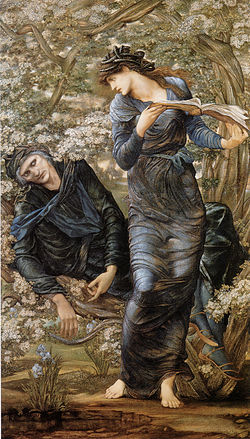The Beguiling of Merlin
| The Beguiling of Merlin | |
|---|---|
 | |
| Artist | Edward Burne-Jones |
| Year | 1872–1877 |
| Medium | Oil on canvas |
| Dimensions | 186 cm × 111 cm (73 in × 44 in) |
| Location | Lady Lever Art Gallery, Port Sunlight, Merseyside |
The Beguiling of Merlin is a painting by the British Pre-Raphaelite painter Edward Burne-Jones that was created between 1872 and 1877.
The painting depicts a scene from the Arthurian legend about the infatuation of Merlin with the Lady of the Lake, Nimue. Merlin is shown trapped, helpless in a hawthorn bush as Nimue reads from a book of spells.[1]
The work was commissioned from Burne-Jones by Frederick Richards Leyland, a Liverpool ship-owner and art-collector,[2] in the late 1860s. After a false start blamed on "poor materials", Burne-Jones began work on the painting proper in 1873, finishing the body of the work by the end of 1874; however, the painting was not first exhibited until 1877 at the opening exhibition of the Grosvenor Gallery in London.[1]
Burne-Jones used Maria Zambaco, who was probably his mistress from 1866 to 1872, for the model for the head of Nimue. Another portrait of Zambaco was used as a reference to Alice resembling her, one of the characters in the 1991 novel King Solomon's Carpet by Ruth Rendell writing as Barbara Vine.
The Beguiling of Merlin was purchased by Lord Leverhulme in 1918 and remains in the Lady Lever Art Gallery to the present day.[1]
The painting features on the covers of the books Possession: A Romance (1990), by A. S. Byatt, and Fiona MacCarthy's biography of Burne-Jones, The Last Pre-Raphaelite (2011).[3]
-
Study of the head of Merlin
-
Study of the head of Nimue
See also
[edit]References
[edit]- ^ a b c Artwork of the Month - January 2003 - The Beguiling of Merlin, by Edward Coley Burne-Jones (1833 – 1898) at Liverpoolmuseums.org.uk.
- ^ Frederick Richards Leyland, 1832-1892 Archived 2007-11-03 at the Wayback Machine at the Center for Whistler Studies.
- ^ Hill, Rosemary (25 August 2011). "The Last Pre-Raphaelite by Fiona MacCarthy". The Guardian. Retrieved 1 October 2011.
Further reading
[edit]- Wildman, S (1998). Edward Burne-Jones, Victorian artist-dreamer. New York: The Metropolitan Museum of Art.


